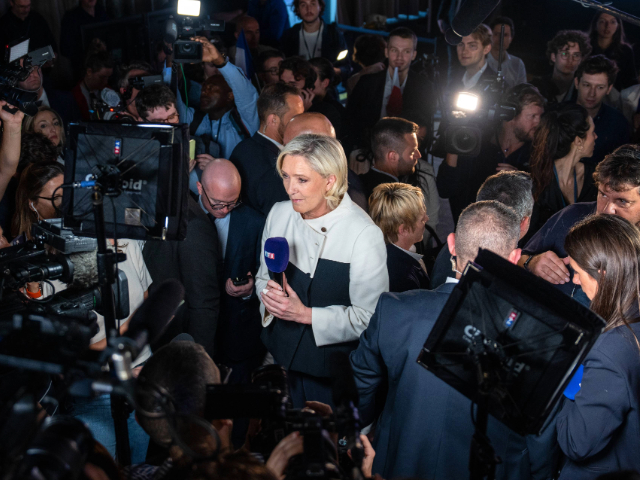China’s state-run Global Times worried on Monday that even though the “far-right has been successfully blocked” by the surprising results of France’s election, “the influence of the far-right has not diminished.”
The rubble of France’s chaotic special election — including some literal rubble created by left-wing demonstrators who rioted even though they nominally won — will be picked through for years to come. The “far-right” referred to by the Global Times, Marine Le Pen and her National Rally (RN) Party, went into the first round of the election with surprising strength — but then the far-left, center-left, and Islamists implemented an effective strategy to get out of each other’s way and collectively overwhelm the RN in key districts.
Everyone seems to have been at least a little surprised by the results, including the shopkeepers who watched their businesses get torched by the ostensible winners. The Global Times was untroubled by radical leftists seizing power and celebrating with an orgy of violence, as long as the “far-right” wound up in third place.
The Chinese Communist paper warned that France is not out of the “far-right” woods yet because the political winds of Europe are still blowing in that direction.
“The RN has become a major force in France, with a growing support base. Even if they are successfully blocked this time, the far-right will not lose the support of the people,” warned Professor Cui Hongjian of Beijing Foreign Studies University:
If traditional political forces want to prevent the far-right from becoming the dominant force in politics, they need to make significant systemic changes. Otherwise, the populist soil will continue to nourish the far-right, making them increasingly powerful in future elections.
On Tuesday, the Global Times made the exact opposite point with a video blog from former editor Hu Xijin, who insisted that the election results prove the “far right” is “still not popular overall in France” and “still has a long way to go before forming a decisive influence in Europe.”
Hu said the rest of the world “does not need to worry too much” about if France’s more moderate leftist President Emmanuel Macron shot himself in the foot by forcing a snap election that then made him play second fiddle to a gaggle of radical left-wingers — a remarkably facile analysis from someone who fancies himself an expert in world affairs. France is a member of the European Union and NATO, so its leadership is a highly relevant concern to other member states.
“As the far-right failed to assume power, France’s foreign policy will be consistent,” Hu predicted.
The Australian Strategic Policy Institute (ASPI) agreed with Hu on that point but explained more thoroughly:
The conclusion from the election is that French foreign policy will probably remain unchanged. The constitution gives the president de jure broad powers in defence (he is chief of the armed forces) and strong influence in foreign affairs, a portfolio that has in fact been seen as the sole prerogative of the presidency since Charles de Gaulle occupied the position from 1958 to 1969.
Macron’s support to Ukraine, his commitment to EU strategic autonomy and his relatively moderate stance on Gaza are more or less shared by other political parties, with the notable exception of [far-left] France Unbowed, which has been hostile to NATO and Israel and has called for immediate peace negotiations between Ukraine and Russia.
Nowhere in any of its editorials did Chinese state media bother to explain to its readers what the issues in the French election were, what makes RN “far-right,” or what the far-left winners of the election are planning to do.
That conversation may get awkward, since one of the major planks in RN’s policy platform is tightening immigration laws, and China’s are already very tight. Le Pen’s critics jeer that she wants to bring back concentration camps, while China has already done it. RN is criticized for indulging in populist and nationalist appeals, but no one does hardcore nationalism better than the Chinese Communist Party — in fact, populist and nationalist tirades have long been Hu Xijin’s stock in trade.
